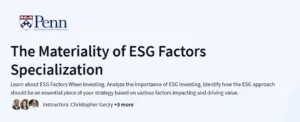What you will learn in Forensic Accounting and Fraud Examination Course
- This course provides an introduction to forensic accounting and fraud examination, focusing on fraud detection and prevention techniques.
- Learners will explore different types of fraudsters, including “accidental” and “predator” fraudsters, to understand their motivations and behaviors.
- The course covers fraud detection tools such as data analytics, Benford’s Law, and financial statement analysis.
- Cybercrime and its impact on businesses are discussed, along with methods to prevent and mitigate risks.
- Legal aspects of fraud examination, including whistleblowing and expert testimony, provide insights into the litigation process.
- Practical case studies and real-world scenarios help students apply forensic accounting principles in fraud detection.
Program Overview
The Accidental Fraudster
⏱️ 1-2 weeks
- Understand the fundamental elements of fraud and why fraudsters commit financial crimes.
- Explore demographic and psychological profiles of accidental fraudsters.
- Learn about fraud prevention strategies and ethical considerations.
The Predator Fraudster
⏱️ 2-3 weeks
- Learn how predator fraudsters manipulate financial statements and commit fraud.
- Understand internal controls and their role in preventing financial fraud.
- Study real-world cases of predator fraudsters in corporate environments.
Big Data, Benford’s Law, and Financial Analytics
⏱️ 3-4 weeks
- Use data analytics and statistical techniques to detect anomalies in financial transactions.
- Apply Benford’s Law to identify fraudulent activities in large datasets.
- Learn how forensic accountants use financial data to detect irregularities.
Cybercrime
⏱️ 4-5 weeks
- Understand the growing threat of cybercrime in financial fraud.
- Learn cybersecurity techniques and fraud risk management strategies.
- Explore major cyber fraud cases and their impact on financial institutions.
Whistleblowing and Future Directions
⏱️ 5-6 weeks
- Examine the role of whistleblowers in uncovering fraud and misconduct.
- Understand legal protections and ethical dilemmas for whistleblowers.
- Discuss emerging trends in forensic accounting and fraud prevention.
Get certificate
Job Outlook
- The demand for forensic accountants is growing due to increasing financial fraud cases.
- Forensic accountants work in industries like law enforcement, auditing, banking, and government agencies.
- Salaries range from $65K – $110K+ per year, depending on experience and location.
- Employers seek candidates with expertise in fraud detection, data analytics, and financial investigation.
- This course enhances job prospects for roles such as Forensic Accountant, Fraud Examiner, and Compliance Officer.
- The rise of cybercrime and complex financial schemes increases the need for skilled forensic accountants.
Explore More Learning Paths
Strengthen your accounting, fraud detection, and financial investigation skills with these curated programs designed to enhance your analytical expertise and deepen your understanding of financial systems.
Related Courses
Introduction to Financial Accounting Course – Build a solid foundation in financial accounting principles, financial statements, and reporting essentials.
Accounting Analytics Course – Learn how to apply data analytics techniques to accounting data for better insights, fraud detection, and decision-making.
Fundamentals of Accounting Specialization Course – Strengthen your accounting knowledge with an in-depth exploration of principles, processes, and practical applications.
Related Reading
Deepen your understanding of how structured oversight protects organizations:
What Is Risk Management? – Explore how organizations identify and mitigate financial and operational risks to maintain integrity and prevent fraud.
Specification: Forensic Accounting and Fraud Examination Course
|
FAQs
- The Accidental Fraudster: Recognizing unintentional fraud.
- The Predator Fraudster: How malicious fraudsters operate and internal controls to prevent them.
- Big Data & Benford’s Law: Detect fraud through analytics and statistical tools.
- Cyber-Crime & Money Laundering: Techniques and stages of digital fraud.
- Whistleblowing: Importance, challenges, and ethical aspects of reporting fraud.





